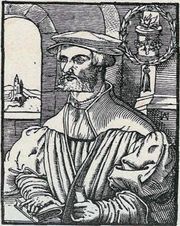|
|
You are not currently logged in. Are you accessing the unsecure (http) portal? Click here to switch to the secure portal. |
Christian Egenolff
| Christian Egenolff, the Elder | |
|---|---|
 Woodcut of Christian Egenolff | |
| Born | July 26, 1502 Hadamar, Germany |
| Died | February 9, 1555 (aged 52) Frankfurt-am-Main, Germany |
| Nationality | German |
| Alma mater | University of Mainz |
| Occupation | Printer, typecaster, publisher |
| Notable works | Der Allten Fechter gründtliche Kunst |
| Spouse(s) | Margarethe Karpf |
| Children | Magdalena Egenolff |
Christian Egenolff (26 July 1502 - 9 February 1555)[1], also known as Christian Egenolff, the Elder, was the first important printer and publisher operating from Frankfurt-am-Main, and best-known for his Kräuterbuch and re-issue of books by Adam Ries, Erasmus von Rotterdam and Ulrich von Hutten.
Egenolff studied humanities at the University of Mainz from 1516, but later took up the trade of bookprinting in Strasbourg, working for Wolfgang Küpfel and marrying Margarethe Karpf. He left Strasbourg in 1530 and started business as a typecaster, printer, and publisher in Frankfurt-am-Main. Over the next 25 years he published more than 400 books, often illustrated by the Nuremberg artists Hans Sebald Beham and Virgil Solis. Egenolff also worked with Jacques Sabon in developing new fonts.
In October 1533 Christian Egenolff was sued by Johann Schott, a noted Strasbourg publisher, for infringement of copyright on Herbarium Vivae Icones, illustrated by Hans Weiditz and compiled and annotated by Otto Brunfels. In his defense, Egenolff argued that nature could not be copyrighted and that plants stood as communal models for any artist.[2] In 1535 he printed the German Bible and his own compilation of Chronica. In the following years Egenolff published works by prominent authors such as Hans Sachs, Johann Dryander, Sebastian Münster, Philipp Melanchthon, and Sebastian Franck.
His daughter, Magdalena Egenolff, married Adam Lonicer, who was one of Egenolff's employees. Lonicer became a director of the firm after Egenolff's death, publishing no fewer than four editions of the Kräuterbuch between 1557 and 1577. Margarethe, Egenolff's widow, carried on the business until 1572; his children continued it thereafter until 1602.
Christian Egenolff was buried in the Peterskirchhof in Frankfurt.
HEMA Contributions
Christian Egenolff is best known in the historical European martial arts community for his publication of Der Allten Fechter gründtliche Kunst. This text was largely a new publication of Andre Paurenfeyndt's 1516 book Ergrundung Ritterlicher Kunst der Fechterey, but with significant additional material by other unknown authors including a severely abridged version of Johannes Lecküchner's messer teachings. This book saw three printings in Egenolff's lifetime, as well as an additional printing by his heirs in 1558.
Additional Resources
The following is a list of publications containing scans, transcriptions, and translations relevant to this article, as well as published peer-reviewed research.
- Bauer, Matthias Johannes (2016). 'Der Alten Fechter gründtliche Kunst' – Das Frankfurter oder Egenolffsche Fechtbuch. Untersuchung und Edition. München: Herbert Utz Verlag. ISBN 978-3-8316-4559-6.
- Bauer, Matthias Johannes (2019). "Egenolff's Fight Book: Form and Thought, Then and Now." The Sword: Form and Thought: 208-215. Ed. by Lisa Deutscher; Mirjam Kaiser; Sixt Wetzler. Woodbridge: Boydell Press. ISBN 9781783274277.
- Grotefend, Hermann (1881). Christian Egenolff: der erste ständige Buch-drucker zu Frankfurt a.M. und seine Vorläufer. Frankfurt am Main: Adelmann.
References
- ↑ J. Christoph Amberger. "The Death of History: Historic European fighting arts in the Mis-information Age". Fencers Quarterly Magazine. http://web.archive.org/web/20060518155508/http://swordhistory.com/excerpts/masters.html. Retrieved 12 October 2010.
- ↑ Koerner, Joseph Leo. The Moment of Self-portraiture in German Renaissance Art. Chicago: University of Chicago Press, 1997. ISBN 978-022-64-49999
